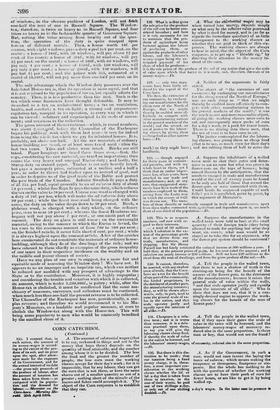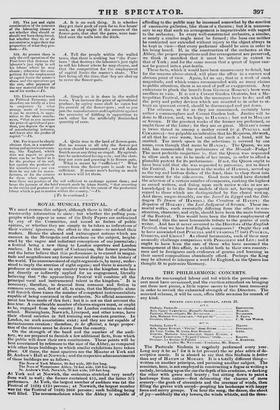CORN CATECHISM.
(Continued.)
123. I contend that, in each nation, the amount of its money-wages is accord- ing• to the extent of the pro- duce of ita soil, and its price upon the spot, after allow- ance made fur the expenses of its Government, and for the annual interest of its debt —the gross sale proceeds of the produce of labour, after the amount of taxation has been taken from them—as compared with its popula- tion and the demand for laberr. — Mereator on the Corn-laws. Meriting Ile. rold. atit April lt334. A. The amount of substantial wages (that is to say', reckoned in things and tint in the money that buys them) depends on the quantity of food attainable, and the number among whom it is to be divided. The less the food and the greater the number of people, the less corn must the working classes accept for their day's work ; for it is impossible, that by any labour, they can get the corn that is not there, or have time same shares out of a smaller quantity as out of a greater ; nothing short of the miracle of the loaves and fishes could accomplish it. The object of the Corn conjurors is ter establish that they can. A. What the trili.vtantial- wages may be when turned into muneye depends simply on what may be the rehtive value possessed by what is used for money, and is (as fair as regards the immediate question) of as little consequence to the working classes as whether they are paid in thick or thin six- pences. The working classes are always to bear in 'Mud, that the object of the Corn conjurors, is to get up a " thimble rig," by diverting their attention to the money in- stead of the corn.
12'7. — only two argu- ments have been fairly ad- duced for the repeal of the Cora-laws.
The first, the extension of our commerce, by exchang • hag our manufactures for the cheap corn of the North of Europe, that we might thereby be enabled nun e ef- fectively to compete with other manufacturing nat. in the general markets of the world ; and the second, an act of justice to the labour- ing classes, by giving them as cheap food as other nations have.—I h.
A. Neither of the arguments is fairly stated.
The oi);ect of " the extension of our commerce, by exchanging our manufactures for the cheap coin of the NoTth of Europe," was no such thing as " that we might thereby be enabled more effectively to com- pete kith other manufacturing nations ire the general markets of the wool! ;" it was the much nearer and more reasonable object, of giving the working classes more corn to eat, and consequently more perks of corn fur a day's work, or a peck for fewer hours. There is no driving into these men, that the use of corn is to have corn to eat.
A. Suppose the inhabitants of a walled town were to shut their gates and deter- mine to eat no corn but what was grown in flower-pots on the tops of houses; being moved thereto by the anticipation, that the numbers engaged in trade and manufactures would at the end of twenty years be found to be only one halt' of those that owned the flower-pots or were connected with them. Could heads be supposed capable of such fully? yet it is paralleled, point by point, by this argument of Mercator's.
129. This is as respects numbers, and now with re- gard to their interests.
A. Suppose the manufacturers in the walled town were told to look at the small quantity of their foreign trade (they being allowed to trade for anything but what they want, viz. corn); what man would be so stupid as to take this for an argument, why the flower-pot system should be continued?
J30. It cannot, therefitre, be asserted, with any shadow even of truth, that the Col n- laws are a tax for the benefit of one part of the community, the landed proprietors, to the detriment of another part, the manufacturing interests; they, as will be shown after- wards, only, in part, tend to raise the general scale of va- lue in the nation, and that scale operates justly and equally upon the interests of all alike.—lit.
A. Tell the people in the walled town, that there is nut a shadow of truth in the shuning-up being for the benefit of the owners of the flower-pots, to the detriment of the manufacturers; because it raises the general scale of value within the
" and that scale operates justly and equally upon time interests of all alike." Who is there that does not see, that it is a cun- ningly-devised engine to oppress the work- ing classes for the benefit of the men of flower-pots ?
A. Tell the people in the walled town, that if they open their gates the scale of value in the town will be lowered, and the labourers' money-wages of necessity re- duced also in the same proportion. Is there man or boy, that would not see the fraud?
A. As if the Government, in such a case, would not soon invent the laying the taxes ad valorem ; which means making the twopence or threepence, fourpenec or six- pence. But the whole has nothing to do with the question of whether the working classes are to have their peck of corn for fewer hours, or are like to get it by being walled up. 111;3. The just and right consideration of the interests of the labouring classes is not whether they should or should not have cheap bread, but whether they do or do not receive in wages their due proportion of what they pro- duce.—Ib.
134. At present there is only the evil operation of the Poor-laws that destroys the labourer's just right to sell his labour where he may choose ; otherwise the com- petition for the employment of capital limits the master's share, and the operatives get the rest, after payment of the raw material and for the we of his works.—Ib.
135. I have not read much on Political Economy, and therefore am totally at a loss to conjecture by what strange mode of reasoning it can be asserted, in oppo. sitiou to the above condo- Pions, "that as you increase the price of agricultural pro- duce, you depress the wages of manufacturing industry, and lower also the profits of A. It is no such thing. It is whether they get their peck of corn for as few hours' woik, as they might if the owners of the flower-pots, that shut the gates, were tum- bled over the walls into the ditch.
A. Tell the people within the walled town, that there is nothing but "the Poor- laws " that destroys the labourer's just right to sell his labour where he may choose, and that the competition for the employment of capital limits the master's share. The fact being all the time, that whey are shut up to serve the flower-pots.
A. Simply as it is done in the walled town. You increase the price of agricultural produce, by saying none shall be eaten but the growth of the flower-pots ; and so you jam the manufacturers and capitalists against the necessity of bidding in 'opposition to each other for the artificially diminished quantity of corn.
A. Quite true in the land of flower-pots. But no reasons at all why the flower-pot system should be continued ; nor did Adam Smith mean any thing so stupid. By agricul- ture he understood having corn; not the shut- ting out corn and growing it in flower-pots.
What is meant by "sufficient?" What comes from the flower-pots is made to be sufficient. It means men's having as much as knaves will let them.
(To be continued.)























 Previous page
Previous page